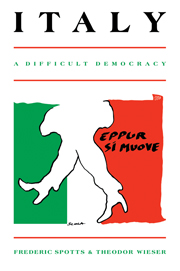Book contents
- Frontmatter
- Contents
- Preface
- Map of Italy showing regional borders and capitals
- 1 The political context
- 2 The Christian Democrats: The indispensable center?
- 3 The Communists' struggle for legitimacy and acceptance
- 4 The ambiguous role of the Socialists
- 5 The small parties: The lay forces and the extremes
- 6 Parliament, prime minister, and president
- 7 Public administration and sottogoverno
- 8 The administration of justice
- 9 Dangers to the state: Plots, terrorism, and the mafia
- 10 Economic and social transformation
- 11 Regional devolution and the problem of the South
- 12 The changing relations between church and state
- 13 Foreign and security policy
- 14 “But it does move” – a summing up
- Appendixes
- Bibliography
- Index
9 - Dangers to the state: Plots, terrorism, and the mafia
Published online by Cambridge University Press: 03 May 2010
- Frontmatter
- Contents
- Preface
- Map of Italy showing regional borders and capitals
- 1 The political context
- 2 The Christian Democrats: The indispensable center?
- 3 The Communists' struggle for legitimacy and acceptance
- 4 The ambiguous role of the Socialists
- 5 The small parties: The lay forces and the extremes
- 6 Parliament, prime minister, and president
- 7 Public administration and sottogoverno
- 8 The administration of justice
- 9 Dangers to the state: Plots, terrorism, and the mafia
- 10 Economic and social transformation
- 11 Regional devolution and the problem of the South
- 12 The changing relations between church and state
- 13 Foreign and security policy
- 14 “But it does move” – a summing up
- Appendixes
- Bibliography
- Index
Summary
Unlike other Western democracies Italy suffers from not just one or two but almost all the ills to which the contemporary state is susceptible – a fragmented party system, weak and unstable governments, inefficient public administration, a politicized judiciary, and political patronage that reaches everywhere. Added to that it not only lacks the ballast of a long democratic tradition but has at times been shaken by a number of exceptional problems – ultraconservative conspiracies, illegal and subversive activities on the part of intelligence services, terrorism from the right and left, and the expanding power of the world's strongest criminal organization. To a great extent, these ills can ultimately be traced to a weak state whose institutions are regarded not as sovereign, respected bodies but as feeble entities to be ignored, manipulated, or even destroyed. Hence whenever one or another of these threats to the state erupts anew, concern arises over the ability of the democratic system to deal with it or even to survive.
Obviously it is difficult to penetrate this occult world. Few hard facts ever come to light and although exposés are not lacking, they are long on speculation and short on verifiable information. But enough has been revealed to offer a glimpse into this underground realm and a basis for assessing its danger to the state.
Conspiracies and “conspiracies”
Paradoxically one of the main subversive threats has come from within the system itself.
- Type
- Chapter
- Information
- ItalyA Difficult Democracy: A Survey of Italian Politics, pp. 170 - 193Publisher: Cambridge University PressPrint publication year: 1986



